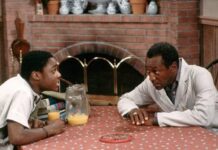
Antonio David Lyons is an artist who has been working at the craft of acting, writing, producing, singing and dancing for the last two decades. Born to a Bahamian mother and Jamaican father, the first immigrant group in Florida, Antonio spent his days thinking, dreaming and planning of a life on stage and screen. An HBCU (Southern University) and City University of New York (CUNY) Theater Management graduate, the University of Michigan scholar-in-residence awardee has been slowly but surely building an enviable body of work, having appeared in critically-acclaimed television shows and films including American History X, Avengers, The Book of Negroes and the academy award-winning film Hotel Rwanda. The triple threat’s wanderlust led him to South Africa where he built a life and a television career with roles on the wildly popular SABC network television shows Scandal, Generations, Jacob’s Crossing, Jozi-H and Home Affairs. Lyons has held his own working opposite award-winning talents like Ed Norton, Don Cheadle, Aunjanue Ellis, Jessica Lange and Lyriq Bent.
With one foot planted in South Africa and the other in the United States, Lyon’s celebrated one-man show launched in South Africa, “We Are Here” comes to Los Angeles, CA, Saturday, October 24, broadcasting live from the Black Voices at the Whitefire Theater.
Directed by Juliette Jeffers, a Caribbean American actor, writer, director, producer and teaching artist, “We Are Here,” tackles the ties that bind the U.S. and South Africa and the toxic culture and environment that results. “We Are Here” is a story about courage and conviction, confronting and ending violence and the importance of recognizing one’s full humanity as we continue to share the Earth.
Lyons wrote the play which has become a movement, traveling across the globe confronting important social justice issues and changing lives In the process. The success of the play resulted in Antonio creating, “We Are Here”, a social activism campaign born in South Africa that utilizes discursive play to engage men and boys in themes of identity, masculinity, relationships, gender based violence and HIV/AIDS. We Are Here has implemented programs and toured in South Africa, Namibia and the USA.
I had an opportunity to catch up with Antonio, who is working on a book of poetry and new music, to ask a few questions.
NB: Like your character in the play, you moved from California to South Africa. Is “We Are Here” based on your life experience?
ADL: Yes, it is! The show is the result of over a decade of living and creating in South Africa. It reflects some of my experiences, moments I’ve witnessed and some fundamental learnings that could only occur because I was living outside my country of origin.
NB: Why did you decide to tell this story instead of the many you could tell as a creative artist?
ADL: I wish I’d decided to tell this story! It felt more like a possession. The story had a life of its own and forced me to give birth to an insistent impulse. The genesis of the play was in response to an international social activism campaign, “16 Days of Activism Against Gender Based Violence”. The campaign was originated by the UN and adopted by countries around the world.
I had a visceral reaction to the campaign and the endemic violence that I’d discovered in South Africa. During my early days in South Africa, I kept trying to reconcile a country with so much joy, hope and possibility with the vicious violence visited on its most vulnerable, particularly at the hands of bodies like mine–Black and male. I was troubled by the absence of black male bodies and voices engaged in support of doing something to stop the violence and shift behaviors. I was raised by a mother whose life’s work was community development, which informed some of my expectations for myself and others, so I began to write a poem a day for 16 days. Those poems would become the core of the play, “We Are Here.”
NB: What did you discover through the writing process?
ADL: I discovered through this process that I still carried unresolved trauma from the murder of my aunt decades earlier and my father hitting my mother, which resulted in their divorce. I also wanted to create a space where entire communities could come together and talk about these issues by seeing themselves reflected in a piece of art. My hope is that “We Are Here” exists as a container that lets an audience community begin the process of having hard conversations, exchange tools and imagine actionable solutions. As artists we get an opportunity to tell a lot of stories, but nothing can ever be as important as telling our own.
NB: Why do you think this story translates to audiences in South Africa and the United States?
ADL: Unfortunately the issues that the play explores are part of our lived communal experiences throughout the African Diaspora. The violence that exists in our homes and the secrets that allow that violence in its various forms to become cyclical is a part of the very fabric of our communities. The intersectional impacts of colonialism, the slave trade, socioeconomic oppression, mental health issues, etc. have produced an against all odds determination to survive, as well as self destructive behaviors. There is always hope. There is always a prayer to be uttered. As a people we believe in the possibility of something better. We want something better for ourselves and our children. We are in the constant search of the, how. That’s what “We Are Here” does. It wades through the trauma and possibility to discover through one man’s path, informed by those he meets along the way, a spark awaiting a flame. That’s a journey that resonates from anywhere you’re sitting on the globe.
NB: Why do you think the time is ripe to bring the performance to the United States?
ADL: As a nation, as Black people, specifically now is a time for deep thinking. Covid-19 has provided an opportunity to slow down and explore who we are and how we got here. A time to have brave conversations about the things that have troubled our spirit. To lean into the things that we’ve kept at bay through the business of our lives. The triple whammy of a pandemic, increased violence against our bodies and a leaderless government that seems to be steeped in white supremacist ideologies have us filled with grief, rage and anxiety. What better time than now to pull it all apart and rebuild it together. Now is a time when Black men feel vulnerable and powerless. This moment is an opportunity to disregard notions of masculinity that are not serving us, our families or our communities. It’s an opportunity to figure out bold and constructive ways to channel our anger, frustration and powerlessness into systemic change within ourselves and the world. I don’t know how to fix big problems outside of myself without first fixing what’s broken within me.
NB: What do you hope audiences get from the performance?
ADL: Hope, possibility, healing and community. I want something good to spark that may illuminate your world.
Check out Lyon’s virtual performance and “We Are Here Workshops” at the South Dallas Cultural Center beginning Saturday, November 12, 2020.
This article was written by Nsenga K. Burton, Ph.D., founder & editor-in-chief of The Burton Wire. Follow her on Twitter @Ntellectual.
Follow The Burton Wire on Instagram or Twitter @TheBurtonWire.









